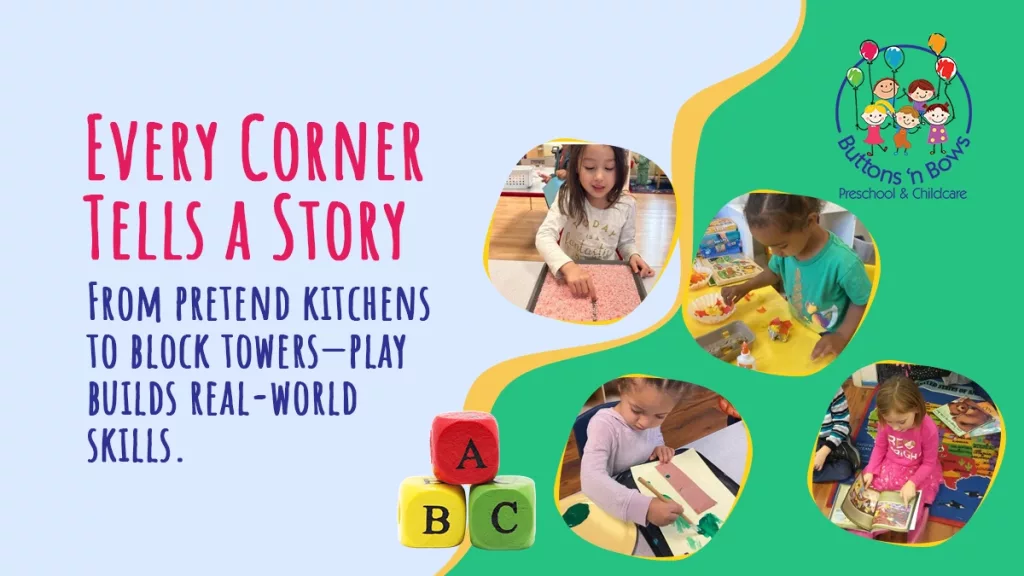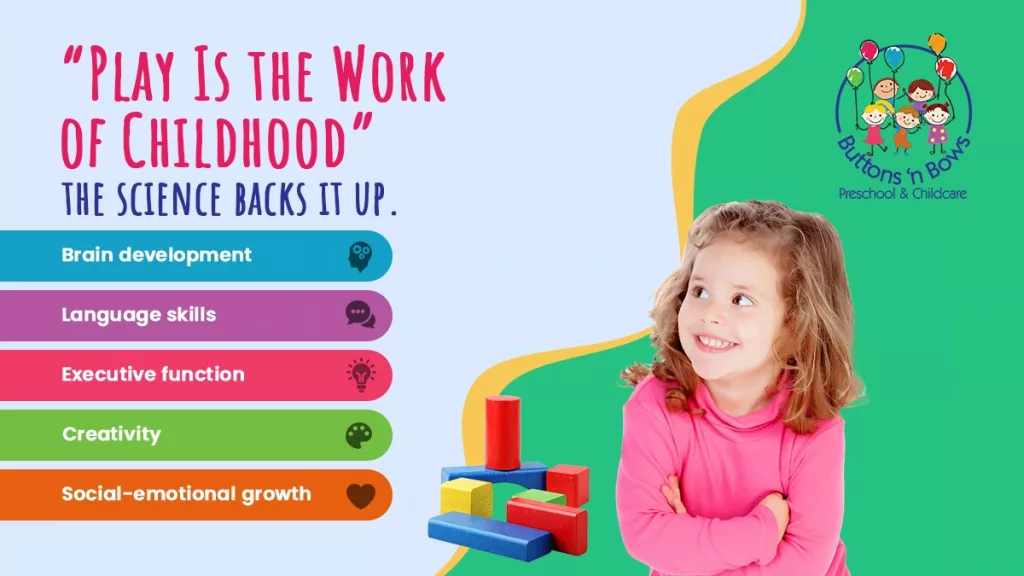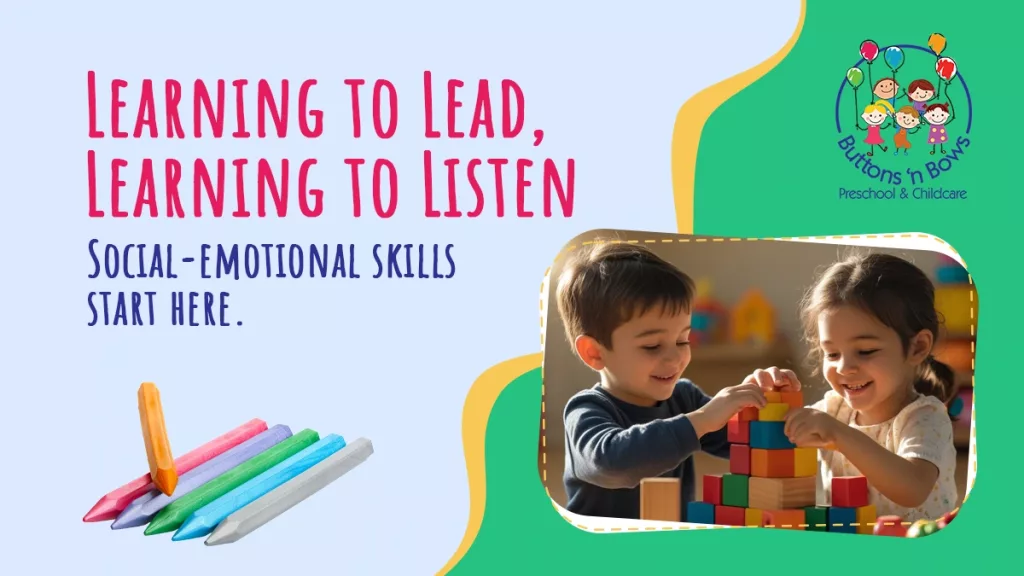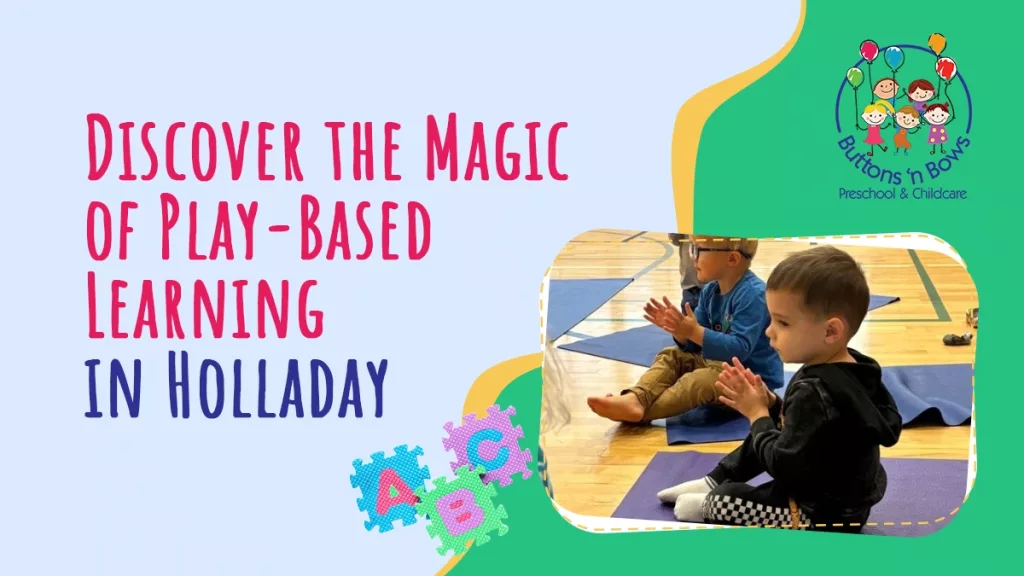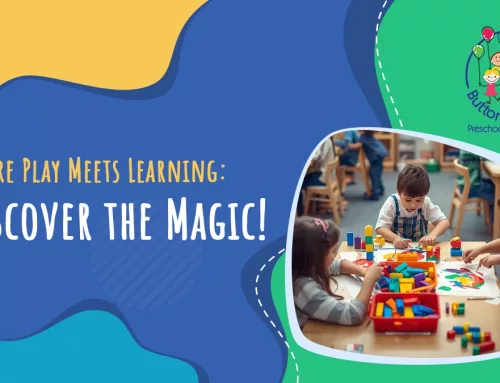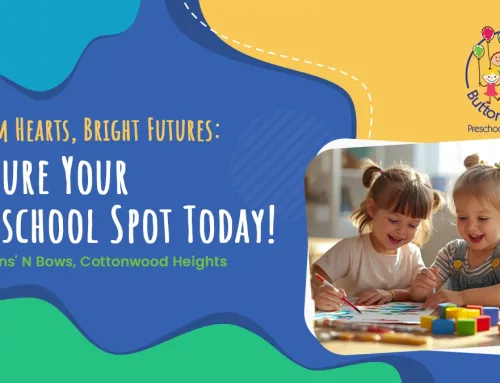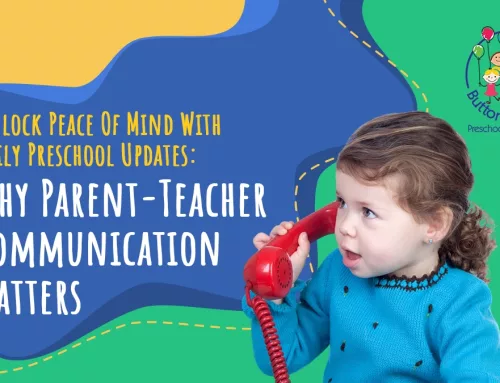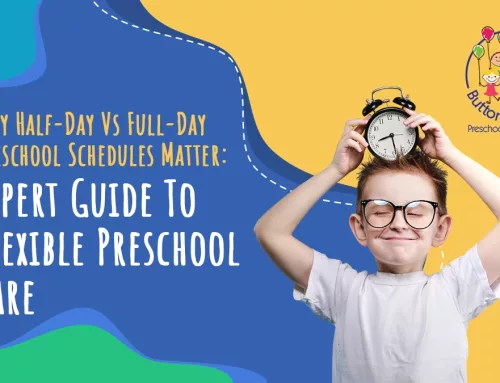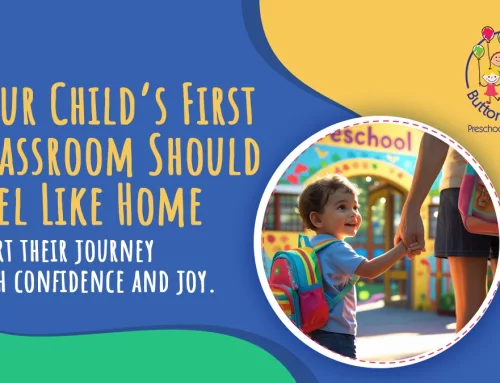When you think of preschool, what comes to mind? Crayons and finger paints? Story time and block towers? While these moments may seem like simple fun, they’re actually doing powerful work behind the scenes—shaping young minds, fostering social-emotional growth, and laying the groundwork for academic success.
When parents consider options for their child’s early education, it’s easy to get caught between ensuring school readiness and preserving the magic of childhood. Many families in Holladay and beyond are choosing play-based preschools—a decision supported by decades of research and the joyful experiences of countless children. Let’s explore exactly why play-based preschool has become the top choice for families and how it lays a foundation for lifelong learning, resilience, and creativity.
What Is a Play-Based Preschool (And Why Do Kids Love It So Much)?
A play-based preschool is exactly what it sounds like: a learning environment where play is the central mode of instruction. But this doesn’t mean it’s unstructured or chaotic. In fact, it’s quite the opposite.
A play-based preschool creates a joyful, engaging environment where play drives learning. Children have freedom to explore, move, invent, and interact—under the guidance of trained educators who structure the experience to maximize every developmental opportunity.
At a high-quality play-based preschool, you’ll find classrooms alive with activity and variety. Every corner invites curiosity:
- Block areas help children develop spatial reasoning, critical thinking, and math concepts.
- Dramatic play stations, like pretend kitchens or grocery stores, introduce language development, negotiation, and basic social rules.
- Art corners, filled with paints, clay, and recycled materials, offer endless chances for self-expression and fine motor development.
- Sensory bins and science tables invite hands-on experimentation with textures, weights, water, magnets, and more.
These intentional setups don’t just keep children busy; they engage multiple senses and challenge children to solve problems, take creative risks, and collaborate with others. A skilled teacher observes, listens, and offers just enough encouragement or guidance to extend the learning. This approach respects that every child develops on their own timeline and that genuine curiosity leads to deeper, more meaningful learning.
Children thrive in play-based preschools because these environments honor their ways of exploring the world. Rather than imposing rigid expectations, play-based programs encourage independence, flexibility, and a love of learning—from the very start.
1. Play is Powerful: The Science Supporting Play-Based Learning
It’s not just intuition—play-based learning is backed by robust scientific research. The American Academy of Pediatrics and the National Association for the Education of Young Children agree: play is not a break from learning; it is learning for young children.
Brain development flourishes during play. Neurologists have found that multisensory, interactive activities activate the prefrontal cortex, which is responsible for crucial skills like reasoning, planning, and emotional self-control. Studies show that playful environments stimulate the release of chemicals that support neural growth, memory retention, and the flexible thinking young children need for academic success.
Key research findings include:
- Children who regularly participate in play-based learning show improved working memory and executive functioning.
- Interactive play supports language acquisition, literacy, and abstract reasoning.
- Playful settings promote motivation and sustained attention far better than traditional, desk-based instruction.
For example, a child sorting beads by color isn’t just playing—they’re learning early math and logic. Building with blocks while discussing plans with friends reinforces teamwork, communication, and spatial awareness all at once.
Play-based approaches recognize that learning is multifaceted and happens best when the mind, body, and emotions are fully engaged.
2. Social-Emotional Learning: Giving Kids Roots and Wings
High academic achievement begins with a solid foundation in social-emotional skills. In a play-based preschool, emotional intelligence is just as important as counting or letter recognition.
Every day, children are immersed in teamwork and friendship:
- Negotiating roles in pretend play (“You’re the chef, I’m the customer!”) teaches flexibility, empathy, and compromise.
- Constructing a group tower or sharing materials hones patience and cooperative problem-solving.
- Teachers support children as they process disappointment, frustration, or excitement—building healthy strategies to manage emotions.
Evidence from the Yale Center for Emotional Intelligence and other leading organizations highlights how social-emotional learning in early childhood leads to stronger academic outcomes, better relationships, and even long-term mental health. Children learn to listen, process feelings, and resolve conflicts—preparing them not only for kindergarten, but for life.
Confidence grows as children try new things, take supported risks, and discover that mistakes are part of learning. This emphasis on resilience and adaptability helps children approach school with curiosity, not fear.
3. Child-Led Learning: Building Confidence and Problem-Solvers
A key difference in play-based preschool is its respect for the child’s own interests and ideas. Rather than following a fixed script, teachers provide opportunities for children to set their own challenges and make decisions about what and how they learn.
- Children decide whether to engage in art, building, reading, or outdoor play.
- They initiate their own projects—constructing a train track, creating a puppet show, or starting an impromptu dance party.
- Teachers observe, scaffold learning (by offering questions, materials, or suggestions), and allow children to drive discoveries.
This autonomy allows kids to become self-motivated learners. They develop perseverance as they work through frustration (“How do I make this bridge strong enough?”), and gain pride in their accomplishments when their creations come to life. Independence, creative thinking, and initiative are practiced every day.
When children feel trusted to follow their curiosity and take leadership in their education, they learn that their ideas matter—setting the stage for lifelong self-confidence.
4. Fostering Creativity and Critical Thinking
Creativity is not just about making art—it’s the beating heart of problem-solving and innovation. In play-based preschools, open-ended materials and activities prompt children to think in new ways and express their unique perspectives.
- Loose parts play (using items like buttons, rocks, fabric scraps) encourages inventiveness by letting children ascribe new purposes to familiar objects.
- Art projects, dramatic play, and storytelling nurture both imaginative thinking and clear communication.
- Problem-solving games ask children to find solutions with no “right” answer—building resilience and mental flexibility.
Research shows that early creativity correlates strongly with later achievements in STEM fields, leadership roles, and adaptability in adulthood. Encouraging these skills in a low-pressure, joyful environment allows children’s natural talents to emerge and blossom. Play-based schools provide exactly this kind of fertile ground for creativity.
5. Supporting the Whole Child: Moving Bodies, Bright Minds
Holistic development is a hallmark of play-based learning. Lessons incorporate mind, body, and spirit—ensuring children’s needs are met on every level.
- Outdoor play is prioritized, weather permitting, helping children build strength, coordination, and a lifelong love of movement. Climbing, running, gardening, and nature walks turn physical activity into science exploration and sensory learning.
- Music and movement enrich the curriculum, fostering rhythm, body awareness, and self-expression.
- Nutrition and health habits are built into daily routines, teaching children about wellness, self-care, and responsibility.
Even during indoor, quieter activities, children are constantly developing fine motor skills (through cutting, drawing, or threading beads); learning mindfulness techniques (through yoga or breathing exercises); and exploring the world through taste, touch, sight, smell, and sound.
These experiences are not just “extras”—they’re essential to a balanced, resilient, and joyful start in life.
6. Creating Positive Relationships with School and Learning
A child’s earliest school memories help shape their attitude toward education. In play-based settings, school becomes a place associated with pleasure, friendship, and exploration—not stress or fear.
- Children eagerly anticipate new themes, special projects, and celebrations.
- Rituals, such as morning circles, birthdays, and holiday festivities, create memorable traditions and a secure, welcoming atmosphere.
- Teachers build strong, trusting bonds with students, calling each child by name and making them feel seen and valued.
This positive, supportive climate means children transition to kindergarten with confidence, curiosity, and readiness—not just for academic work, but for the social challenges of a new environment. Parents frequently report that play-based preschool alumni approach school transitions with enthusiasm and resilience.
7. Ready for Kindergarten—and for Life
Contrary to old myths, research continually shows that play-based programs prepare children exceptionally well for kindergarten and beyond.
Graduates of play-based preschools typically possess:
- Robust communication skills, able to express ideas, and ask for help.
- Emotional regulation, allowing for focus and perseverance in the classroom.
- Comfort with routines and independence in managing tasks.
- Strong early math, literacy, science, and reasoning skills—learned organically through stories, games, and discovery.
A child who’s learned to share, listen, solve problems, and try new things without fear of failure is well-equipped for any challenge school (or life) brings.
Academic achievements matter—but so do curiosity, adaptability, and empathy. Play-based programs excel in building the well-rounded “whole child” that elementary teachers love to welcome into their classrooms.
Discover the Magic at Buttons’ N Bows Preschool—The Best Play Preschool Holladay
At this point, you may be wondering: where can I find a play-based preschool in Holladay that offers all of the above—and more?
Buttons’ n Bows Preschool & Childcare has been a trusted part of the Holladay community for decades, offering a developmentally rich, play-based experience for children ages 6 weeks to 10 years.
Here’s what sets Buttons’ n Bows apart:
Play-Based, Child-Centered Curriculum – From science experiments to storytelling, every moment is an opportunity to learn through play.
✅ Certified, Passionate Teachers – Staff are trained in child development, CPR/first aid, and relationship-based guidance.
✅ Enrichment Activities – Yoga, music, dance, cooking, field trips, and outdoor play are integrated into the weekly rhythm.
✅ Family Involvement – With events like Donuts with Dad, Mother’s Tea, and the Winter Program, families are always part of the fun.
✅ Two Convenient Locations – Serving families in both Holladay and Cottonwood Heights.
Most importantly, Buttons’ n Bows is a place where childhood is celebrated—where each child is seen, heard, and supported as they grow.
Choose Play. Choose Joy: Choose Our Holistic Preschool Programs Holladay
In a world that often rushes childhood, play-based preschool offers something different: a chance for kids to explore, imagine, and discover who they are—without pressure, without performance, and with plenty of laughter along the way.
If you’re a parent in Holladay searching for an early learning environment that prioritizes your child’s joy and development equally, we invite you to discover the magic of play-based education at Buttons’ n Bows Preschool & Childcare.
Schedule a tour today and come see where meaningful learning begins with play.




